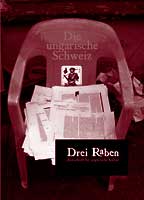Drei Raben - Zeitschrift für ungarische Kultur
Three Ravens - Journal for Hungarian Culture
Publishing House: Három Holló Alapítvány
Subject(s): Literary Texts
Frequency: 1 issues
Print ISSN: 1586-8583
Status: Later issues not available
- 2000
- 2001
- 2002
- 2003
- 2005
- 2006
- 2007
- 2008
- Issue No. 1
- Issue No. 2
- Issue No. 3
- Issue No. 4-5
- Issue No. 7
- Issue No. 8-9
- Issue No. 10
- Issue No. 11
- Issue No. 14
Articles list
{{ article.TitleOriginalLanguage }}
{{ article.TitleOriginalLanguage }}
({{ article.TitleEnglish }})
- Publication: {{ article.Publisher }} ({{ article.Issue }})
- Author(s): {{ article.Authors }}
- Contributor(s): {{ article.Contributors }}
- Language: {{ article.Language }}
- Subject(s): {{ article.Subjects }}
- Issue: {{ article.Issue }}
- Page Range: {{ article.PageRange }}
- No. of Pages: {{ article.NumberOfPages }}
- Keywords: {{ article.Keywords }}
- Summary/Abstract: {{ article.SummaryAbstract }}
- Price: {{ common.currency(article.Price) }}
Short Description
Drei Raben / Three Ravens - The German-language periodical for Hungarian literature Hungary, as seen from a linguistic point of view, is an (en)closed country. It is precisely this (en)closed nature that provides both for intense controversies as well as an obstinate literature. This is a treasure, which needs to be discovered if there is to be more to Hungary amidst an expanding Europe than just market and expanse. The Budapest circle Drei Raben (Three Ravens) has been “opening up” Hungarian culture for the German-speaking population under the guidance of Wilhelm Droste since 1998. The group focuses on publishing the literary periodical Drei Raben. The editorial staff, working in an open workshop-format, seeks with its choice of texts to reveal both internal and external inter-relations of Hungarian culture and to animate these in their translations. Emphasis is laid on translating pieces of literature, which elude the taste of publishers and cultural trends. Besides essays, literary texts and interviews centred around a central topic it is mainly contemporary Hungarian literature that the periodical Drei Raben presents. Photography (both historic and topical), is naturally presented in its own right and does not merely serve an illustrative purpose. The editorial staff, which is composed of Hungarian students of German Studies and of native German speakers living in Hungary, who mostly work as translators or pursue part-time studies here, meets every Wednesday in café eckermann, in the building of the Goethe-Institut. This used to be the favourite café of the famous Hungarian poet Endre Ady in his time and bore the name Három Holló, in English: Three Ravens. Consequently, organising exhibitions, literary evenings and lectures, i.e. contributing to the restoration of the old coffeehouse-culture is among the main goals of the group Drei Raben. The periodical arose from a translationseminar at Eötvös Lóránd University’s chair of German Studies. In 1999, on the occasion of the Frankfurt book fair having Hungary as its central topic, the group Drei Raben published an elaborate literary supplement in Pester Lloyd, a German-language weekly journal in Hungary. A weekly Drei Raben-page with features and translations has been part of Pester Lloyd since then. The periodical Drei Raben has been published since the year 2000 and has devoted itself to various topics. There has been a literary quest for the Danube-Monarchy’s coffeehouse-culture and its special role in Hungarian cultural life, memories of Hungarian women have been dealt with and Berlin has been introduced as a place of inspiration for Hungarian literature during the course of the 20th century. Last year, for the 125th anniversary of Endre Adys birthday, Drei Raben dedicated a double issue to the Hungarian poet-classic, who, in spite of numerous translations of his work, did not manage to get into world literature. The topical issue of the periodical deals with the exciting and tense relation between Budapest and Vienna and with a Hungarian view on Vienna. The next issues will be looking at Hungarian literature outside our borders, at Jewish life in Hungary and at the "Hungarian Switzerland".

